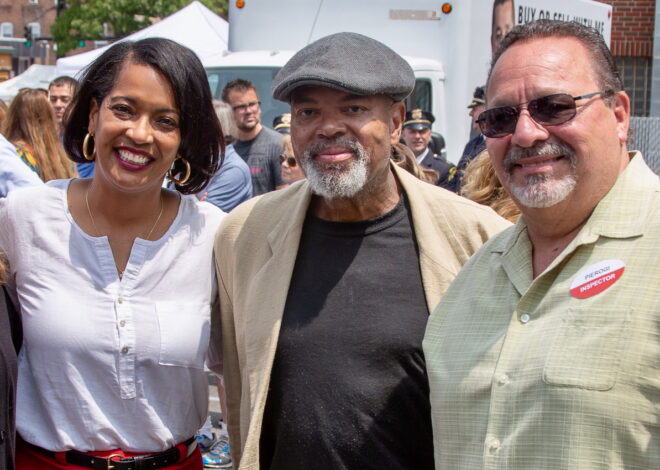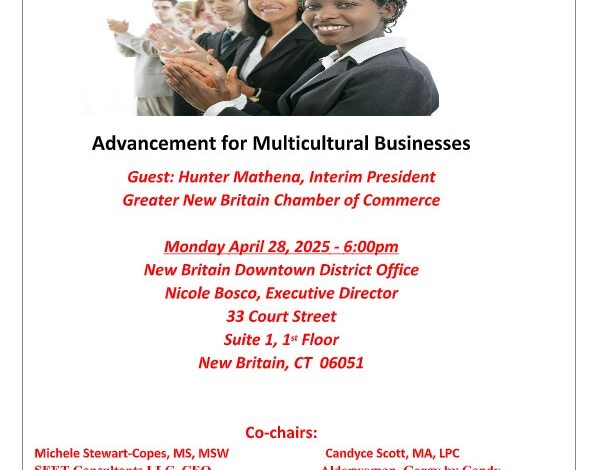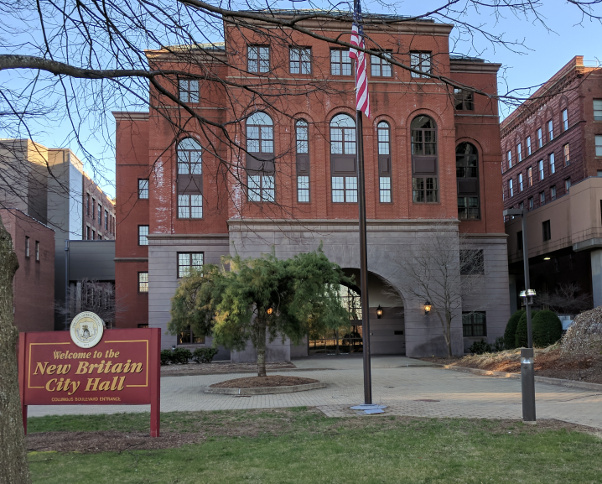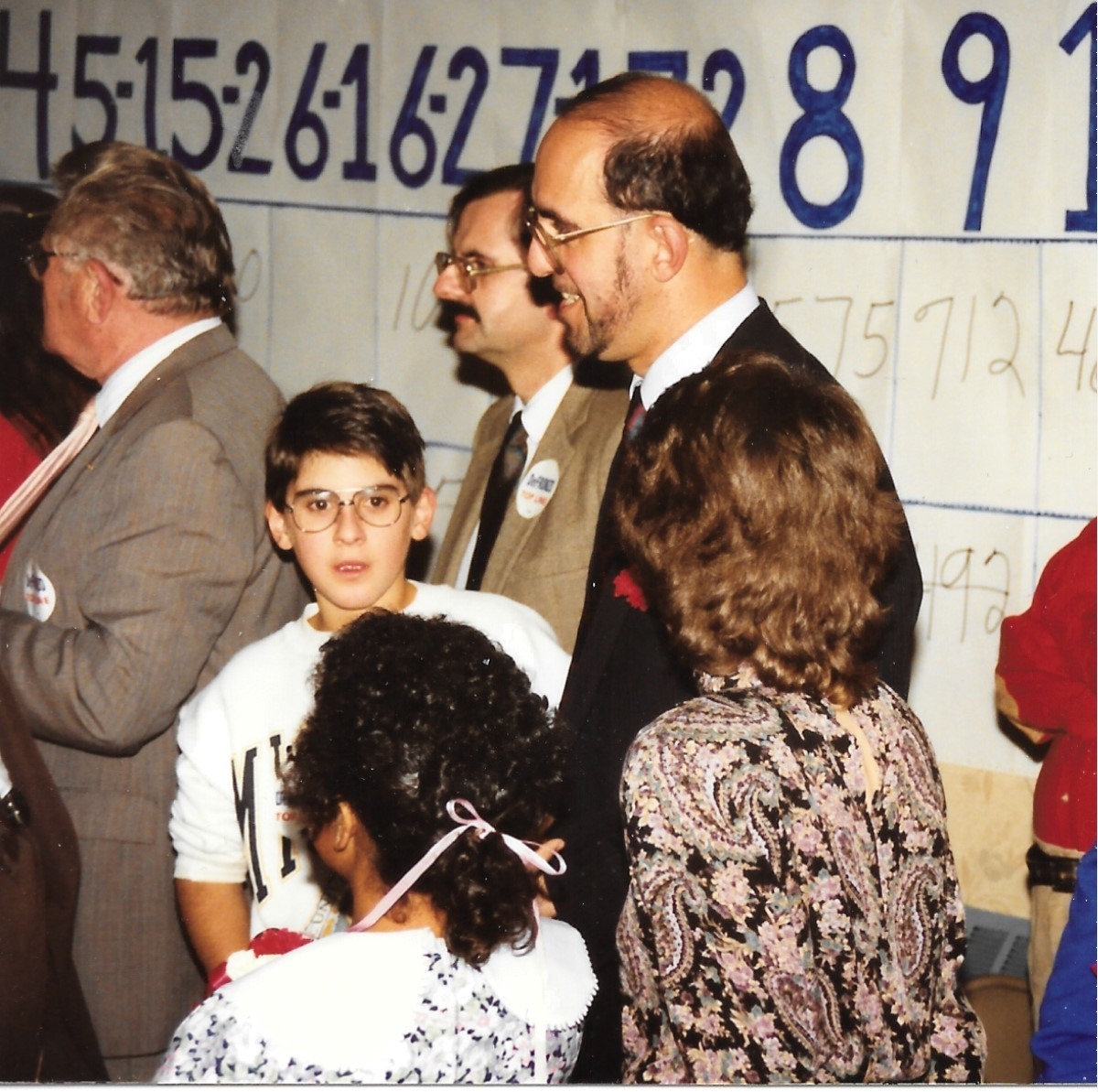
Watershed: New Britain’s 1989 Mayoral Campaign (Part 2)
The Municipal Election That Changed New Britain Politics For A Generation
Introduction
In 1989, Donald DeFronzo became New Britain’s 34th Mayor ending the late William (Billy Mac) McNamara’s six terms as the city’s top elected official, a modern-day record not matched until last November when Mayor Erin Stewart won a sixth, two-year term.
“During the depths of the Covid pandemic in the spring and early summer of 2021 I began to write this (campaign) retrospective after watching a CNN documentary on the Vietnam War,” states DeFronzo. “One segment of that series dealt with the opposition to the war and the number of individuals who had achieved conscientious objector (CO) status and how that status impacted their lives. It caused me to question how many of these roughly 500,000 individuals had gone into a career in elective politics and government. Although my search was limited, I could not find one prominent politician who had been a conscientious objector. ” DeFronzo took on the incumbent with a “time for a change” message on taxes, spending and neighborhood needs. Withering attacks on his conscientious objector status from some but not all in the McNamara camp were intended to derail his candidacy. They failed.
In Part 2 of a 3-part series from NB Politicus DeFronzo recalls the withering attacks and the campaign leading to his endorsement by the Democratic Town Committee in July and Primary victory in September of 1989.
Watershed: New Britain’s 1989 Mayoral Campaign Part 1 January 21, 2024 NB Politicus
Watershed: 1989’s Mayoral Election, excerpted here, is DeFronzo’s personal account of the 1989 municipal campaign based on his observations, the recollection of friends and news coverage at the time. A copy of Watershed is on file in the history room of the New Britain Public Library. Thanks to Don DeFronzo for permission to publish an abridged version in this series. John McNamara. This series originally published at NB Politicus.com
Part 2
CO Issue Round Two
As Memorial Day approached, I was confronted with a new dilemma. Should I attend traditional Memorial Day observations or avoid them? The mayor would be presiding over the major events. His supporters would attend in significant numbers and many veterans would attend. My presence might create a ruckus or some type of distraction. On the other hand, my absence could leave me open to criticism for being disrespectful of those who had served in the military. This became a personal decision.
No doubt some of my supporters would be at the events so I wouldn’t be entirely isolated, but I certainly didn’t want to do anything that could distract from the solemnity of the services. Our political advisors were split on this. Some preferred a more confrontational, in your face approach – show up, be seen, be respectful and leave. Others thought the low- profile approach was safer and would avoid any potential confrontation with overly aggressive political opponents. One or two thought it would not make a difference.
In the end, Diane and I hashed it out, and thought the low-profile approach was best. It gave us, and not some hostile individual, control of the day. I would make a personal visit to the World War I Veterans section of Fairview Cemetery located within walking distance of our home. I would suspend all campaign activity that day, pay my respects in private and move on. If assailed for failing to attend the formal ceremonies, I would respond by saying, given all the heated discussion over my draft status, I did not want to cause any distraction to the services.
I turned my attention back to canvassing. It was Friday, May 26, the day before Memorial Day. I was walking the lower Eastside section of New Britain when I knocked on a door and began a discussion with a middle aged male Democratic voter. After few minutes, he said, “What did you think of that ad in the paper today?” He was talking about the New Britain Herald which was home delivered in the afternoon starting around 4 P.M. I hadn’t seen the paper. I’ve got to say when he showed it to me, it rattled me. To become known as “the Wall ad” it was a one-half page political ad from the McNamara camp. It included a well written emotional letter recounting a visit to the Vietnam Memorial in Washington D.C. The writer internalizes the experience, shares a deep sense of loss with the reader and says he will never forget the sacrifice of those whose names are on the Wall. It concluded with the following:
“For you, whose names are on the Wall are the brave young men and women. You answered the call when it was just as popular to turn your back. Don’t ask me to forgive those who wouldn’t go, who took the easy way out. Forgiveness is not mine to bestow. That can only be given by the names on the Wall. And don’t ask me to forget. I can’t. I wouldn’t if I could. To forget is to lose the message of the Wall. It is the message of love, and of those who were brave enough to give it.”
There was a large photo of the Wall artistically presented and framed. Below it, replete with a photo of the mayor was the campaign message:
“RE-ELECT A VETERAN MAYOR
MAYOR WILLIAM MCNAMARA
TWELVE YEARS ON THE JOB
So here it was, Bill McNamara’s second assault using the CO issue. With the Veteran’s Council maneuver having come up short, the new assault would be more direct, more public and clearly associated with the mayor himself. I finished my canvassing for the day, went home, showed the ad to Diane and wondered about its impact. We agreed that it was a powerful, attention-grabbing ad coming on Memorial Day, but also felt it could engender a negative response as it was clearly an attempt to rekindle and exploit the divisions of the Vietnam era.
It was Friday night and there was not much we could do about it. I did decide to stick to our plan for Memorial Day observations and see what might follow on Monday. That night, as he did every night, Walter called. At the top of his agenda was the “Wall ad” . He too thought it was a powerful ad but questioned its impact. He said there was something familiar about the photo used in the ad. He had seen it before in a book of Vietnam Memorial photos. He seriously doubted that it was original. In the morning, he said, he would go to the library and track down the book. He suspected that Mac’s campaign may have lifted the photo and used it without authorization.
We discussed a few other things and called it a night.
Saturday morning came. I made my visit to the Fairview Cemetery, spent about one-half hour at the World War I Veterans section, thought about the sacrifices so many had made over the years to allow me the opportunity to seek office in New Britain in 1989. I was sincerely grateful. I returned home and mowed my lawn–always a mind clearing, therapeutic activity. Halfway through the back yard Walter showed up with a book in hand. He had found it. It was a book of photos by Wendy Watriss, a Houston based free-lance photographer. As we scanned through the photos, there was no doubt that the “the Wall ad” photo came right out of her collection. The question was what should we do next?
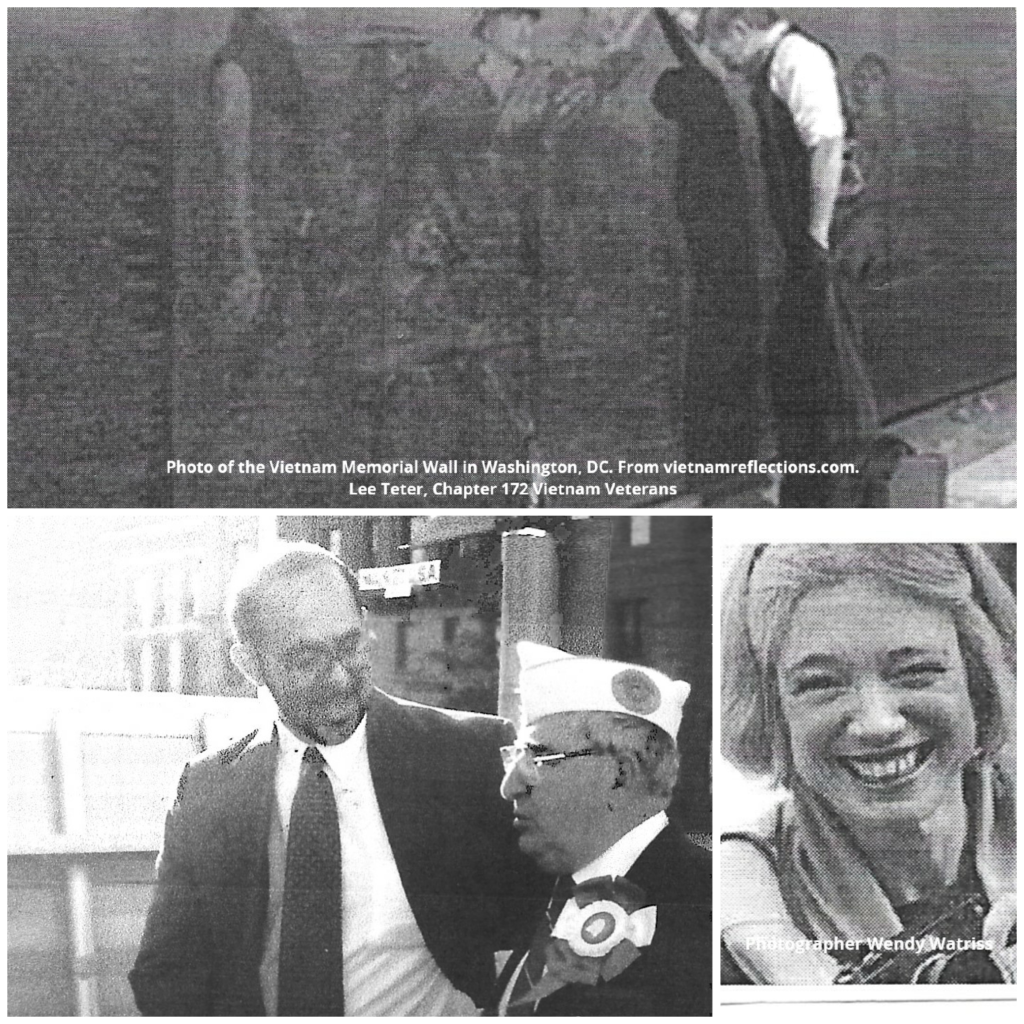
After consulting Joe Harper and Jim Leavenworth, three distinct options emerged. One, we could write a letter to the McNamara campaign charging them with a copyright infringement. That would put the ball in their court, compromise the element of surprise that we controlled and, in the end, might not result in a whole lot. Two, we could contact the photographer and ask her to assess her legal options and sue the McNamara campaign, creating an embarrassing situation for the incumbent. The third option was to notify the New Britain Herald of the abuse, while at the same time contacting the photographer and advise her of the situation. We opted for number three because we felt involving the local newspaper would ensure several days of news coverage and shift the focus from the CO issue to the ethical, perhaps illegal, conduct of the McNamara campaign. So, we proceeded on that path.
Although Clebowicz had found the photo and identified the photographer, more work needed to be done before the campaign could act. Wisely, Clebowicz and Leavenworth wanted to have some idea of how Watriss would respond to having her work used as a political advertisement, and what her disposition on the politics of the Vietnam War might be.
Following the Memorial Day weekend, Clebowicz began a ten-day effort to track down and speak to Wendy Watriss, the photographer. He started with the book’s publisher in California and finally contacted Watriss in Houston, Texas. Subsequently, he talked to her and faxed her the Wall ad. It became clear that her work was intended to heal the wounds of Vietnam, not perpetuate them. She was upset that the McNamara campaign would use the photo without permission and, even more, that they perverted its intent. With that information in hand, Clebowicz and Leavenworth were clear to approach the New Britain Herald, as previously planned.
On the next day Clebowicz and Leavenworth went to the Herald and presented reporters with the evidence of McNamara’s transgression. The Herald jumped on it and in a front- page article McNamara campaign officials were put on the defensive, admitting that they had lifted the photo from Watriss’s work without her permission, but claimed it was an oversight. Attorney Clebowicz turned up the heat and claimed copyright infringement, ethical misconduct and arrogance. Mac, completely caught off guard, responded in person, denying wrong doing and for the first time publicly lashed out about my CO designation in very harsh, almost incoherent terms. It wasn’t a good look for a “veteran mayor”. Herald reporters did further investigation learning that the letter appearing in the ad had been written by former Mayor James Carey, one of McNamara’s commissioners, now serving as a campaign media adviser.
Another front-page article followed when Wendy Watriss, the photographer, sent a letter to the McNamara campaign, with copies to the Herald, the Hartford Courant and Clebowicz. She said:
“Not only did I not give my permission for this photograph to be used, but its use violates the spirit and purpose of my work at the Vietnam Memorial. I certainly do not approve of it being utilized to support a polemic on patriotism in the context of an electoral campaign.”
It was a serious condemnation of Mac’s tactics and clearly demonstrated that his campaign had made a serious miscalculation. His attempt to play on the painful divisions of the Vietnam period for personal political gain had been exposed. He was now on the defensive.
Clebowicz, Leavenworth and I continued to toast McNamara and his campaign staff with charges of unethical and illegal conduct. Clebowicz attacked saying:
“To rip off a photo from an artist for a political ad which is not the point of the whole memorial is totally dishonest,” said Clebowicz keeping Mac’s campaign on the defensive.
The Herald followed with yet another editorial discussing the May 30 ad and the tactics involved in its use. Letters to the editor criticizing Mac’s campaign for firing up old disagreements appeared in the Herald. One letter entitled “Mayor’s advertisement renews old wounds” was representative of the sentiment being expressed.
Following the “Wall ad” McNamara’s campaign seemed to be paralyzed for two weeks as they dealt with the copyright infringement problem and political backlash. Matters had been made even worse when Carey called Watriss and offered to buy the rights to the photo. This caused another Herald story implying that Carey’s offer was a tacit admission of using the photo inappropriately. Watriss adamantly refused the offer, asked for an apology and announced she did not expect to take any legal action.
Although not reported in the press, it became clear that the botched handling of the “Wall ad” had created a split in McNamara’s campaign leadership. Information coming back to our campaign indicated that Jim Carey, the architect of the “Wall ad” was exiting the campaign. Apparently, some of Mac’s close supporters were coming to the conclusion that their pursuit of the CO issue was not paying off and may, in fact, be counterproductive. The younger members of his leadership group, Alderman David Malinowski, Council Majority Leader, and Daniel Salerno, a candidate for the Board of Education, were clearly uncomfortable with the tactic. From our perspective, McNamara’s second attempt to discredit my candidacy on the basis of the CO issue had not been successful. McNamara had been put on the defensive, his campaign staff had been fragmented, and again, the CO issue was proven to be a non- issue as few, if any, seemed moved by the mayor’s tactics.
Whether it was Mac’s preoccupation with the “Wall ad” controversy, a decision not to give me additional publicity, or just a missed opportunity, he and his campaign never did attack me for failing to attend Memorial Day ceremonies on the 26th. In retrospect I often wonder if it would have been a more productive tactic for Mac to do that, instead of using the “Wall ad.” We will never know.
The Mayoral Primary
Janet Paskowski-Hillier, a Democratic city alderwoman, decided to enter the mayoral race as a third candidate. On June 13th, she announced her candidacy. Janet’s mother had served with me on the Town Committee and was a friend. Harper and I had promoted Janet for her spot on the Common Council. Early in the Coalition’s candidate selection process Janet had sought support for herself. Her efforts were unsuccessful and, at that point, she abandoned, not only her quest for mayor, but also her re-election plans for City Council. Now, two months later, without much fanfare, or observable support, she entered the Democratic field as a candidate for mayor. Her husband Charles Hillier had briefly been a mayoral candidate earlier in the year, but his arrest on arson charges here in New Britain, and a previous criminal record in Massachusetts including arson, forgery and bigamy doomed the attempt.
Neither my camp, nor the McNamara camp could estimate what effect Janet’s candidacy might have on the race, or even if her candidacy would survive to the September primary.
As we continued to fill out our slate, we moved into June. On June 1, we added Nancy Tinker, a design engineer employed in the Connecticut State University system, as a candidate for the Board of Education. Nancy had been working with me for weeks on my door-to-door campaign. Each week I would turn my canvass cards with voter codes over to Nancy who would record each name and assessment on a spread sheet. She would then work with a small group of volunteers who would send out a follow-up post card to each home I visited. These people would then also be targeted for phone calls from our phone bank with the objective of reaching voters three times. She regularly tabulated the results so we could keep an eye on how many pro-DeFronzo voters we had identified. Nancy was a valuable volunteer and a great candidate.
Also running for the Board of Education would be Wilson Gonzales, a colleague of mine and union friend who had moved to New Britain several years earlier. He was the second Hispanic on the slate. At the same time, Paul Aust, former president of Citizens Action for New Britain (CANB), the city’s primary community organization, would be a candidate for City Council. Paul had led CANB in a number of fights with McNamara and he had developed a large following in the community.
In rapid order we added five candidates for City Council: Paul Mangiafico, Commander of the VFW, the city’s largest veteran’s organization; Sharon Beloin, a young professional woman working in the Connecticut General Assembly; John Geragosian, 27, a young political activist and son of prominent city attorney, Harold Geragosian; Ray Palmucci, a leader in the Citizens Property Owners Association (CPOA), a conservative taxpayers advocacy group, and Joe Rubino, a young newcomer from a good New Britain family.
Previously, popular incumbent Aldermen Ed “Butch” Dzwonkowski, and Joe Harper ally, Charles Bugnacki had announced their plans to join our slate. Finally, former eight term Alderman and McNamara ally Thomas Moore, looking for a new political home, joined our slate on the day of the Democratic Town Committee endorsement to round out the 15-member at large slate.
As we approached the July endorsement session, we were confident we had the votes to control the nomination. In fact, we had been working for years to take a sizable majority on the Town Committee and we had achieved that the previous year. Our only concern was that we had sufficient votes ( two thirds majority) to change the rules of the Committee to select the endorsed candidates by slate, and not by individual position. By nominating and voting for the entire slate at once, we could guarantee that we would all run together on the same line. At a Town Committee meeting in late June a test vote was constructed to change the rules and set the date for the nominating session to a date of our preference. Walter Clebowicz was the floor manager for the night. He made the motions and led the debate. Our forces prevailed 30-15 on each of the measures considered. The rules were changed, the date was set, and it was now clear to all that the DeFronzo slate would be nominated on July 24, forcing McNamara to collect over 1,000 signatures to secure a spot on the primary ballot. Clebowicz had demonstrated for the public, a full month in advance of the endorsement session, that we had the votes and that McNamara had met his match. More front-page stories, more momentum and growing support were all products of that evening’s maneuver.
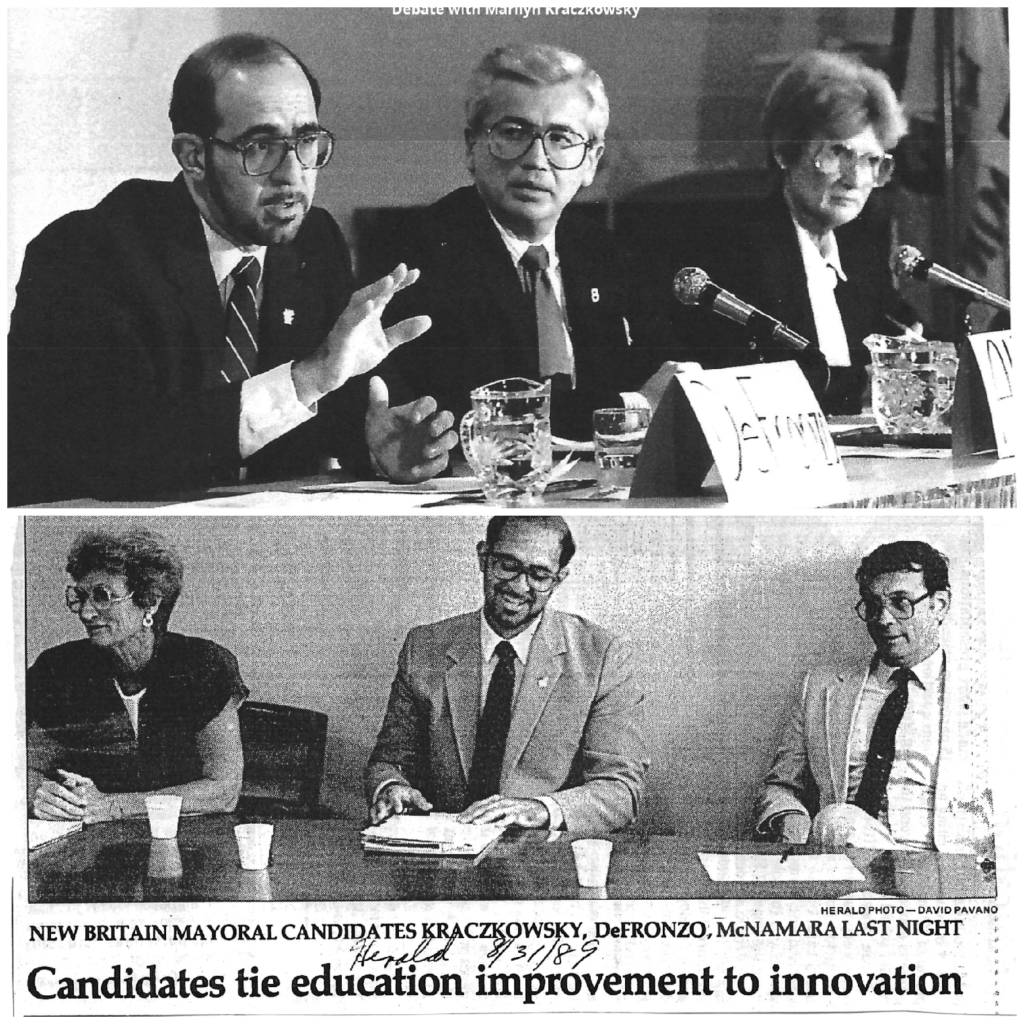
As we ended June and began to anticipate the Town Committee showdown on July 24, we looked at the slate we had assembled: young bright newcomers, experienced veteran politicians, liberals and conservatives, representatives of New Britain’s diverse ethnic mix and community activists. The only deficit was the absence of an African American candidate. Despite our strong efforts, African American leaders remained loyal to Mayor McNamara and did not desert him. Connie Collins, the only incumbent African American on the Council was a friend but felt obligated to McNamara because of his Police Chief selection.
Burned twice on the CO issue, Mac had backed off after the Memorial Day Wall ad. He said he was delegating public comment to his campaign staff and from thereon would be far more selective in what he had to say. Many believed he had gone way over the line with his personal attacks on me in the aftermath of the campaign’s copyright infringement problem. Caught in the wrong, he responded by lashing out in an uncontrolled, undisciplined manner -not a good look for the leader of your city.
Anyway, the CO issue was not yet behind us. On July 15th, two weeks before the scheduled Democratic endorsement session, our old friend Moe Parparian announced the formation of a veteran’s political action committee, “United Veterans” to conduct fundraising and political activity. Marc Crowe, the Hartford Courant reporter, having followed the CO-veterans saga in New Britain from the start of the campaign, characterized it this way:
“Frustrated by the divisiveness and inaction of veteran’s groups, several veterans’ leaders have formed a political action committee for more fire power.”
As inferred by Crowe, there was an irony here. United Veterans needed to be formed precisely because there was a lack of unity in New Britain’s veteran community. Obviously, I’d be the target of the new group. Paul Mangiafico, former commander of the VFW, responded forcefully:
“The forming of this new veteran’s group of McNamara cronies has to be the joke of the century, an insult to the voters of New Britain. .. This is just a shim sham by people trying to smear DeFronzo because of his alternative service.”
When asked, Parparian didn’t rule out running political advertisements “against DeFronzo”. Parparian had now solidified his alliance with Billy Mac by assuming a spot on his ticket as a candidate for Board of Tax Review. Other United Veterans executive board members included familiar names, Paul Manafort and Leon Hermanowski, two of the geniuses who had organized the disastrous late February political lynching attempt by the Veteran’s Council. Nonetheless, if successful this group would be independent of the individual veteran’s organizations, many of which opted not to get involved in Parparian’s earlier efforts. They could be a more visible force, speaking with one voice. There wasn’t much we could do, other than have our supporters expose the group for what it was, as Mangiafico had done.
As the dust settled after the initial announcement, a day or two later The Herald weighed in with another editorial.
“Military service is not a requisite for serving in elective office. A CO is not the equivalent of a draft dodger or deserter. Mr. DeFronzo should be judged on the merits of his vision for New Britain, not on why he served his country at a hospital instead of in Vietnam.”
More letters to the editor followed and despite the creation of the United Veterans, we did not see any real uptick in anti-CO sentiment. My door knocking which had continued unabated through the spring and into the hot days of summer, was not detecting much, if any, unusual comment on my draft status. Far more important to New Britain voters was the city’s excessive tax rate, crime and a host of neighborhood issues.
During a door-to-door canvassing effort in Diane’s old neighborhood, I met Evelyn Karwoski, the mother of some of Diane’s childhood friends. She reminisced about Diane and her family and said she planned to vote in the primary. Having been coded as a pro-DeFronzo voter, we notified her of an upcoming $5 per person spaghetti fund raiser. A few days before the fund raiser I received in the mail a note from Mrs. Karwoski saying she enjoyed meeting me, planned to vote for me , but couldn’t afford the $5 ticket. She did send me what she could afford, a $2 bill, hoping it would help the campaign. We let her know she was welcome at the event, but I don’t think she attended. I kept that $2 bill as a “good luck token” and carried it in my wallet for the rest of the campaign, and as it has turned out, every day since that July day when I knocked on her door. Many years later, in 2017, Mrs. Karwoski’s son, Chester, contacted Diane as he and his wife were visiting in the area. We met for lunch, and I had the opportunity to tell Chester the story and show him that $2 bill. It was a good memory.
On a Saturday morning in early June, I set out the ambitious goal of canvassing most of East Street, one of the longest streets in New Britain, in one day. With most of the residencies on East Street being two- or three-story multi-family dwellings, requiring a lot of stair climbing, this was going to be a challenge. It was a cool day, and feeling energized, I began the canvass. A good part of East Street was in my Town Committee district, and having canvassed the area several times in Town Committee elections, I had met many of these voters previously. Unlike voters in other parts of the city, many of these voters had voted for me once before.
The results on this Saturday morning were very good. Many people were home, the responses were good and I even picked up a couple of lawn sign locations, an added bonus on a well-traveled street. Starting at the intersection of Smalley and East Streets I walked down one side of East Street south, all the way to Ellis Street and then started back up on the opposite side. With the Wall ad controversy still stirring, I felt especially good about the friendly and supportive responses I was getting. This was one of the few days when I canvassed more than one hundred homes.
As I moved up the east side of East Street, getting toward the end of my long, nearly five-hour, route I stopped at the home of Joe LaPointe and his wife. Mrs. LaPointe answered the door quickly. I introduced myself but she said she knew who I was. We chatted briefly. I gave have her a campaign flyer and started to leave. Just then she stopped me, saying that her husband was a veteran and he very much wanted to talk to me. Not knowing what to expect, I felt a bit apprehensive. When Mr. LaPointe came to the door, I immediately recognized him from St. John’s Church, which we both attended regularly. He told me he had been following the campaign closely and had been hoping I would stop by. He wanted me to know that he was a veteran, and he was supporting me. He asked that I make sure he got a sign for his front lawn. Relieved, I thanked him and finished my day feeling very upbeat about the outcome. From that day forward, whenever I drive by his home, I remember that visit, and how good that sign looked on his front lawn.
Kenny Kahrmann was a hard core New Britainite living on Smalley Street. I met him on a warm July day while canvassing a densely populated neighborhood on the east side of town. On that Saturday morning I started out about 10 AM planning for a four-hour walk to be followed by some family time and an evening campaign event. For the most part this was a multi-family area running from Smalley Street to East Main Street. I had made good progress with generally positive responses. Because of the density of the neighborhood, I far exceeded my 50 family a day quota, although it had also been a very demanding day with the many multi-story apartment buildings requiring a lot of climbing.
I was working my way up Smalley Street heading for home, with only ten or twelve stops left, when I came to Kenny’s home. I knocked at the front door with no answer, so I moved around to the side door when I saw him sitting on a lawn chair reading the newspaper. He shot a glance in my direction and startled me by yelling in a loud voice, “It’s about f***ing time you got here. I’ve been waiting for you. I hate that f***ing McNamara and want one of your signs right there,” as he pointed to the corner of his lot. As it turned out Kenny was angry about taxes, angry about Mac’s disregard for neighborhoods and just plain mad. He told me he grew up in Diane’s old neighborhood and knew her family and he planned to vote in the primary. He offered me a beer, but with a few more doors to knock, and behind schedule, I declined.
Thirteen years later, when I announced my candidacy for the State Senate in a district that included Berlin, Kenny called me, unexpectedly, and reminded me that he had a lawn sign in 1989 and told me, that as a Berlin resident, he was supporting me for State Senate. He then gave me a couple of lawn sign locations in Berlin. I valued his support and think about his family often.
Door to door canvassing had become a fundamentally important, daily campaign activity. We publicized the effort widely and many voters were waiting for me when I got to their neighborhoods. Often, they would share their concerns and complaints about neighborhood problems – speeding cars in one area, noise pollution in another, potholes, sidewalks, abandoned property, litter, crime, zoning and others. Voters who lived in their homes thirty or forty years told me I was the first candidate, ever, to come to their door. This helped us increase our voter base and augment the prospects for a higher voter turnout in September.
My daily voter assessments were turned over to Nancy Tinker who added them to a data base used for mailings, fund raising and volunteer recruitment. Once confirmed voter IDs from canvassing became part of our target population for “get out the vote” efforts as we approached election day.
Canvassing became a routine activity for me. Being familiar with city neighborhoods, and voters in such an intimate way, prepared me well for candidate debates and media inquiries. They also gave me a true vision of what voters thought and prompted me to research what efforts had been undertaken in other cities to address similar issues. The benefits of canvassing were considerable, and to visualize the extent of my efforts I started recording my progress by highlighting the streets I had canvassed on a map of the city with colored markers. After every third or fourth day of canvassing, usually late at night, I would pull out the map and chart my progress. Later, when other candidates on our slate started going door to door, they would give me the names of the streets they had visited, and I would map their results as well. It was a daily measure of my progress and gave me a sense of accomplishment throughout the campaign.
I have kept that map through the years and occasionally look at it, and remember the extraordinary effort that was required to win that race in 1989. My mom and dad always taught me that hard work would pay off. They were wise parents.
Having now canvassed over 5,000 homes, door knocking had become a signature characteristic of my campaign. Voters would often welcome me by name, saying they had been waiting for me to get to their neighborhood. This was a far cry from the cold, lonely days of February and early March. Others on my slate who were doing door to door campaigning , Sharon Beloin, Nancy Tinker, Pete Rosa, Wilson Gonzales and others reported much the same results.
About a week before the July 24th endorsement session, Herald Political reporter Bill Neagus, a guy occasionally mistaken for me because of our similar hair style (very little on top and a lot on the face) wrote a column about the ongoing campaign. In it he said there was little doubt that I would be the nominee and move on to the September primary as the party’s endorsed candidate. He noted that the accomplishment of taking the endorsement away from a six-term incumbent demonstrated the extent of McNamara’s vulnerability. He added, however, that the endorsement was no guarantee of a primary victory, noting that Billy Mac had twice before emerged as successful in a party primary after having lost a Town Committee endorsement.
Neagus reported that, even at this late point in the campaign, McNamara campaign aides “… indicated they weren’t that concerned about DeFronzo because he isn’t well known. They pointed out that our campaign had conducted a poll in February and they found out that “DeFronzo was anything but a household word.” Astutely Neagus commented that the difference is that was several months ago and “… since then DeFronzo has been hard at work campaigning door to door. At last count he has knocked on approximately 3,000 doors (actually it was now over 5,000) and his visibility is increasing.”
Neagus also speculated that the presence of Janet Paskowski-Hillier on the September ballot could help McNamara as she could pull “a couple hundred votes” away from DeFronzo in the city’s Polish voting wards. In any event, his analysis demonstrated just how far we had come since February 10th. We were just about ready for prime time on July 24.
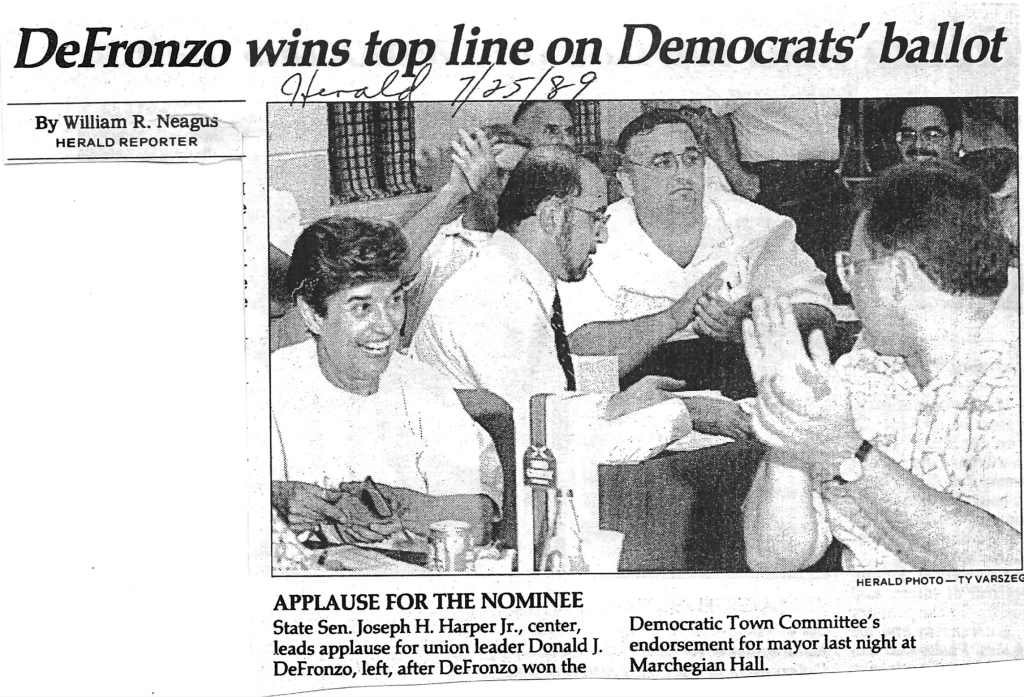
It was Monday night at the Marchegian Hall. Fifty-seven Town Committee members were present and having done such an excellent job at the June meeting, Clebowicz was again the floor manager. Once the nominating speeches had been made, three names -DeFronzo, McNamara and Paskowski-Hillier- were presented to the Committee for the vote. The final tally even surprised me. We knew we had a commanding advantage, but the final numbers were: DeFronzo 40, McNamara 15 and Paskowski-Hillier 2.
It was an overwhelming victory trumpeted on the front page of the New Britain Herald the next day and prominently in the Hartford Courant as well. If removing McNamara from office was a voter’s primary interest, it was now clear that he was seriously vulnerable and that the best option for terminating his 12-year hold on office, CO issue or not, was Don DeFronzo.
McNamara and Paskowski-Hillier would now have until August 11th to collect 1,076 valid signatures to qualify for the September primary ballot. That would not be a problem for the mayor, but it still was not clear if Paskowski-Hillier would stay in the race or fail to get the signatures.
Heading Toward the Primary
Billy Mac, never a shrinking violet, boldly predicted victory on September 12. We were now in the home stretch with seven weeks to go before Democratic voters made their choice in the primary.
Almost immediately another controversy erupted. At the end of July Ed Karwoski, Democratic Registrar of Voters, called me, irate that the city’s Finance Director, John Jedrzejczyk, had accessed Democratic voter files and printed mailing labels for the McNamara campaign in an after-hours adventure. He said that this had never been done before, and in no case should it have been done without his knowledge and approval. Seeing an opportunity to portray McNamara as having abused his power, Walter Clebowicz immediately filed a Freedom of Information (FOI) request demanding all information from the Finance Department pertaining to the after- hour printing of labels, a factor which added a color of impropriety to the action.
The exchange went on for several days giving us additional publicity, while putting McNamara on the defensive once again. Karwoski went on the record saying that, if he had been asked, he would not have authorized the use of the voter files for use by any campaign. It was a careless error by the McNamara team. They could have purchased labels from the Democratic State Central Committee without controversy. When the story was told, Paul Vayer, the mayor’s Executive Aide and campaign spokesperson, had made the request of Jedrzejczyk, excluding Karwoski from the approval chain and creating the appearance of a conflict showing that Billy Mac was campaigning from City Hall and using city resources for his personal political gain. That the labels were printed after hours, and Karwoski was excluded from the decision only made the action look worse than it actually was. Clebowicz played it like a pro draining every ounce of negative publicity out of the story.
On August 10th McNamara gave us yet another opportunity. He appointed Moe Parparian, his point man in the multi-pronged anti-CO campaign, to a full-time paid position as Director of the city’s Veteran’s Service Center, a position that Moe had wanted to eliminate several years earlier. The appointment to the $30,000 a year post looked like political payback for his loyalty and services to the mayor as his campaign’s anti-DeFronzo hit man. Mangiafico, now on our slate, jumped all over the appointment and again McNamara was on the defensive.
The August 11 deadline for the filing of petition signatures for the Democratic primary was at hand. McNamara had already qualified by virtue of submitting a sufficient number of valid qualifying signatures well in advance of the deadline. We were all waiting to see if Paskowski-Hillier had the signatures to gain ballot access. Our camp had always wanted a one on one with McNamara believing that was our best opportunity to win. That added to the deadline drama involving Paskowski-Hillier.
On August 11, the filing deadline, Paskowski-Hillier announced she would not be submitting signatures saying she had decided to forgo the race for mayor. She offered several incoherent reasons for her decision to drop her candidacy, but most knowledgeable operatives believed she simply failed to amass the 1,076 signatures needed to qualify. McNamara instantly said her absence from the ballot would benefit his campaign, I thought it would benefit mine. Now, as we entered the last month of the campaign, we had what we had hoped for, a one-on-one primary with Mayor William McNamara.
In the first week in August “old reliable” Moe Parparian announced that the United Veterans was going to circulate a petition critical of my candidacy, an obvious effort to resurrect anti-DeFronzo voter sentiment based on the CO issue. The petition read:
“We the undersigned, seriously question why any American, who refused to wear the uniform of the U.S. Armed forces, feels he is qualified to be the Mayor of New Britain. In time of crisis, he put his personal safety before duty to his country. While he basked in the comforts of his home protected by the Constitutional umbrella of security, we ask: Who was conscripted in his place? Did he survive?”
Parparian said the action of the United Veterans was necessary because of the “political philandering by a minority of veteran leaders…” He went on to assail me for hiding behind the Constitution, for supporting flag burning and for wanting to “remove God” from the Pledge of Allegiance, all things I flatly denied, challenging Parparian to provide one piece of evidence, one public comment I had ever made in support of flag burning or removing God from the Pledge. I countered that he was acting as a self-appointed Joe McCarthy working for the McNamara campaign, a charge which he denied. Reporters, however, quickly pointed out that of the seven Executive Committee members of the United Veterans, four were men with obvious ties to the McNamara administration – Parparian, who had recently been appointed to $30,000 a year job, John Truhan, an appointed Parks Commissioner, John Markow, an appointed member of the Veteran’s Commission and Paul Manafort, McNamara’s Public Works Commissioner. The evidence was apparent. The same old gang was working the CO issue one last time before voting on September 12.
Complicating the matter even further for McNamara was the reaction of his Council Majority Leader David Malinowski. He had quietly split with the mayor on the Wall ad, but now, sensing that his association with Billy Mac and the mayor’s tactics on the CO issue might be eroding his once invincible prospects for re-election, now made his opposition to the United Veterans and their petition public. He called Parparian’s petition drive a “travesty” and defended my right to seek office saying, “The reason that the veterans fought in wars was to protect the Constitution and the right of people to dissent.” Yet another public rift had been opened in the McNamara campaign. We never found out, and the United Veterans never disclosed , how many signatures had been collected. In the end , however, it appeared that the petition drive had little or no effect on undecided voters. One previously undecided voter wrote to the Editor of the New Britain Herald:
“What goes around comes around and isn’t it funny that it is the attacks on Don DeFronzo which have finally decided me to vote for him. A man that can stand up under this kind of brutal, small-time, hit man stuff and keep his composure as Don DeFronzo has, is the man I admire and respect and want to see as mayor.”
That seemed to be the consensus that had been forming for a while, and now, just weeks before the primary showdown, was showing up in unsolicited letters to the editor. The repeated spectacle of division within the McNamara camp over one of their central campaign themes was a plus for us and made Mac look like he had lost control of his campaign.
With only three weeks left until the primary, we hoped this would be the last organized CO offensive, but still we were concerned about the potential of the United Veterans.
One amusing moment in the campaign came in late August when one morning Diane and I awoke to find about 250 McNamara lawns signs piled on our front lawn. When I talked to Leavenworth that morning, I learned that hundreds of our signs had been deposited on McNamara’s front lawn. Apparently, some kids thought that would be a good prank to play on the city’s politicians. It was a good one and we never found out who was responsible for “Lawngate”. The event did lead to a high-level negotiation over a lawn sign exchange, successfully repatriating each campaign with their signs.
There were only two face-to-face appearances in the entire campaign and they occurred late. On August 29, just two weeks before the primary, The West Farms Condo association sponsored an event. Residents peppered McNamara with questions and criticisms, most of which focused on his lack of accessibility and concerns about neighborhood issues. I provided assurances of a different approach, but the content of the questions and criticisms confirmed the vulnerabilities we had been talking about for months.
The second joint appearance of the campaign came on August 31 before the downtown business community. This was McNamara’s crowd, business leaders many of whom had benefited from his economic development largesse. Joe Harper, Walter Clebowicz, Jim Leavenworth and I designed a cogent proposal reorganizing city economic development agencies into one new community development agency providing a better balance between downtown development interests and the needs of neighborhoods . A new governing board would be constituted to include more neighborhood residents. We had to be careful. Mac would be right there at the dais and would reply, as would members of the business community who might be put on the defensive by such a proposal.
I put on my best public administration demeanor and delivered a straightforward, no nonsense proposal along with the rationale for pursuing it. I specifically charged McNamara with being hostile to neighborhood organizations over his twelve-year tenure and that a shift in emphasis had to be made. While things were, in fact, looking better in downtown New Britain, neighborhoods were slipping into decay, infrastructure repairs were being ignored and crime was a growing problem. McNamara denied that neighborhoods were suffering because of his policies and said he was proud of his economic development achievements.
Larry Davidson, a well-respected New Britain businessman (also a close friend of Joe Harper) rose to praise Mac’s economic development record and suggested that my comments and proposal came very close to being anti-business in substance. We had anticipated this line of attack. I responded, saying the “…city needed to balance business interests with neighborhood concerns to forestall the creation of two New Britains – one for the wealthy business community and the other for impoverished residents. It is clear to me, and many others in the community, that the current administration has defined economic development in the context of business and commercial interests. I propose that economic development can no longer be viewed as oriented toward business interests only.” McNamara was fuming but chose to let his allies in the business community reply. They did continue to laud McNamara’s achievements but did little to dispute the decline of the neighborhoods – maybe because many of them did not live in New Britain. The “two New Britain line”, the vision of a growing economic and social gap, was I thought, the highlight. Again, McNamara was put on the defensive. Even if these businessmen and women didn’t agree with my proposal, they couldn’t say it wasn’t a practical application of the policies I espoused. All in all, I was very pleased with my performance as was Joe Harper who was in attendance. The Herald gave the event and subsequent discussion wide coverage in the morning paper.
In addition to the two face -to- face exchanges, New Britain Parents for Education sponsored a candidate forum on educational issues that would include the recently endorsed Republican candidate for mayor, Marilyn Kraczkowsky. Kraczkowsky, a member of the New Britain Board of Education, was a sharp critic of the school system and had narrowly lost a mayoral race to McNamara in 1987.
It was a small gathering of about 15 parents. McNamara defended his record. To his credit he had invested heavily, $81 million, in school related capital improvements during his tenure, and as a former teacher had strong ties to the current superintendent, Marie Gustin. Kraczkowsky was far more critical of the superintendent than McNamara or me and dominated the meeting.
It had been a long day, and I was glad it was over. I had performed well. Mac was still on the defensive, the CO issue was not raised at any of the three public forums, and I had escaped without any major missteps or errors.
Interestingly, during this period the notion of a candidate debate never came up. We didn’t think McNamara wanted to give me a platform on which I would be compared to him face to face and increase my recognition. I was always concerned that a debate might give Mac an opportunity to raise the CO issue in some kind of unmanageable or unpredictable way that could create a problem and deflect from the progress we were making. At the time, the League of Women Voters was not sponsoring primary debates so there was no initiative from them to organize a debate. If challenged to debate, I would have agreed to participate, but I wasn’t going to be the one to start the discussion.
Since the covert label printing episode, relations between popular Democratic Registrar of Voters Ed Karwoski and the mayor had grown tense. Karwoski remained angry that he had been by passed in allowing access to the voter list over which he had legal control. He said that, if asked, he would not have given access to McNamara, or any candidate. He did not believe that was the job of the Registrar of Voters.
McNamara had already gotten his labels and had blown off the whole spectacle saying it was no big deal and any candidate could get the labels printed the way he did. Taking him up on the offer, and not wanting it to look like our FOI complaint had been a purely political exercise, Walter approached the Finance Department and requested a set of labels. Almost as if a gift from on high, the Finance Director announced that he had changed the policy and could not grant the campaign’s request. Any request for labels now had to be submitted to Karwoski. True to his stated position, Karwoski denied our request. When Mac was confronted by the reality that his surreptitious acquisition of mailing labels now appeared to have benefited his campaign, to the disadvantage of ours, something that he maintained was not the case, he blew up at Karwoski and called him “anti-Irish”. To this Karwoski fired back setting up a very public clash between a popular Polish American politician and McNamara at a time when Polish votes were in high demand. Walter charged that Jedrzejczyk, the Finance Director, had conveniently changed his policy to favor his boss, Bill McNamara. Jedrzejczyk denied it, but the fact was that we still did not have the labels.
An embarrassed Mayor McNamara called on Karwoski to provide the labels – he refused. The mayor looked weak and ineffective, as he was unable to correct a problem his Executive Aide had created. It just looked like he was playing loose and fast with his authority. It’s funny how little missteps can sink a campaign.
Throughout the last six weeks of the campaign our phone calling efforts expanded to day time calling. Now operating from 10 A.M. to 8 P.M., we were contacting thousands of voters in the space of a week. Whenever volunteer attendance waned, Diane, (the candidate’s wife, acting on behalf on the candidate) would call through the volunteer list and, in her very personal way, encourage them to come in for another shift or two. It worked every time.
Including my door-to-door canvassing, follow up mailings, and multiple phone calls voters were reached three to five times. In the process we amassed a large list of committed DeFronzo voters, who would be our target audience on primary day. These calls also identified those who needed absentee ballots and rides to the polls. The volume of ride requests was getting so large that we started pre-scheduling pick up times a week before the primary and we worked to ensure that we would have an adequate number of drivers to meet the demand. Mary Ellen Harper, Joe’s sister, and Sal Bonola, a close friend from earlier Town Committee battles, coordinated that effort.
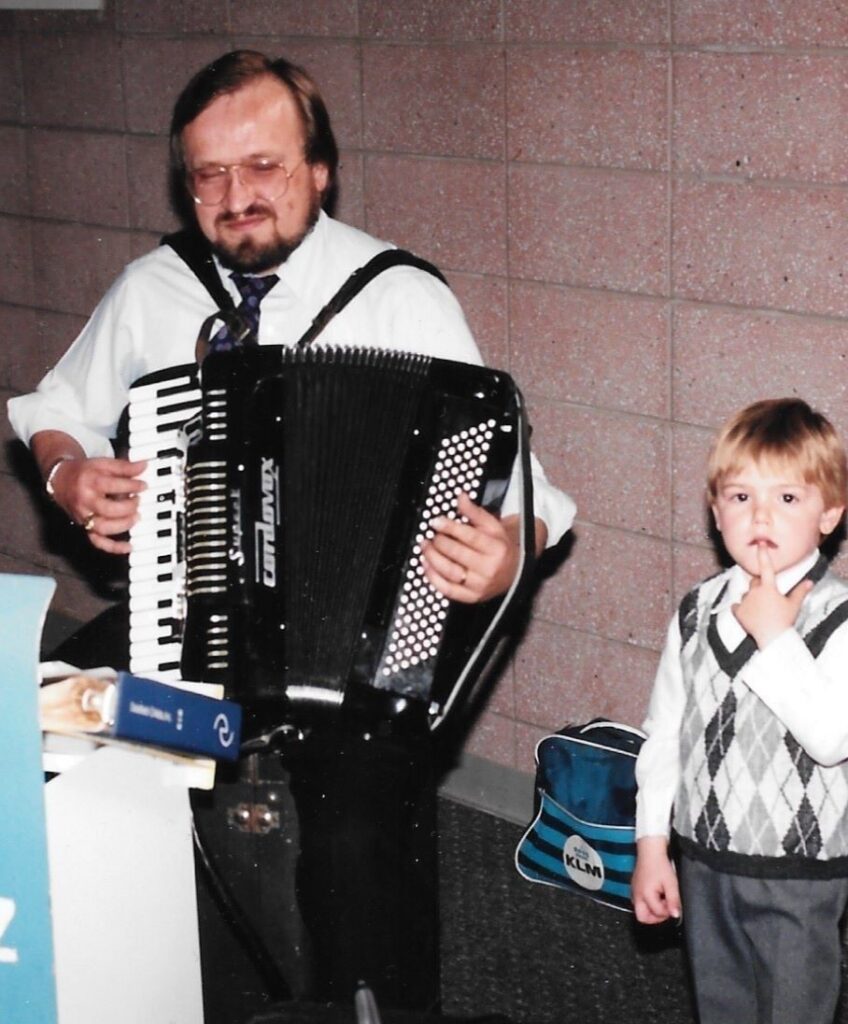
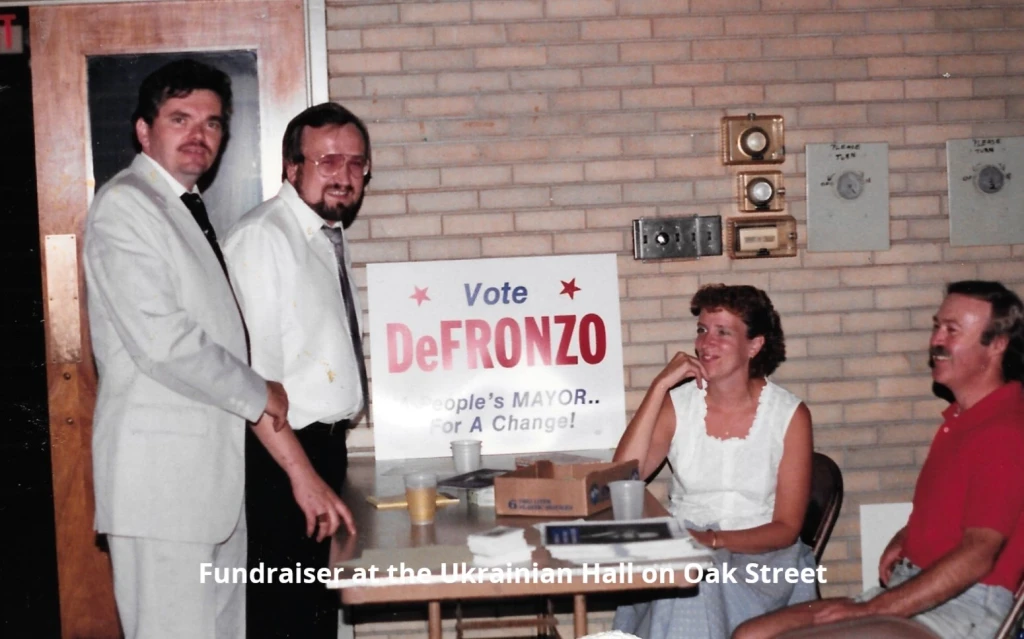
We also worked hard to ensure that we kept up with lawn sign requests and repairs. For months we had hundreds of signs put up, and the numbers continued to swell. We were now up around five hundred locations.
The United Veterans petition drive would not go away. Now, a second member of the McNamara slate, Dan Salerno, a candidate for the Board of Education, broke ranks with Parparian, and denounced the effort in much the same way as had Alderman Malinowski. Salerno, who described himself as an anti-war activist in the Vietnam era, said DeFronzo’s war time record “was a non-issue.” He said that as a progressive Democrat, he was “totally disassociating” himself from the “inflammatory remarks” of Mr. Parparian. The McNamara camp was now in total disarray. Instead of attacking me, they trained their guns on each other in what was yet another embarrassing moment.
Parparian would not be silenced, saying Malinowski and Salerno would not be able to “close his mouth.” Now referring to Malinowski and Salerno, and not me, Moe remarked, “This political philosophy espouses a brand of liberalism that has taken this country to where it is today…complete moral decay.” If this didn’t prove the point our campaign had been trying to make since February, I hoped my contribution to the dispute would put it all in context. I said, “It doesn’t surprise me that people on that slate are willing to criticize Parparian. It has become clear that there is no uniform position on the issue among veterans, among McNamara supporters or among the general public. We can conclude from this, that decisions made during the Vietnam era are just not particularly relevant to the election for mayor of New Britain.”
From the beginning, our February poll had demonstrated a large percent, about 35%, of voters didn’t think Vietnam era military service was an issue, and another, even larger percent, 54%, were unsure of the issue. It had always been our objective, not to convince voters that my anti-war beliefs were correct, but that they made no difference in terms of local elected office. Here, now in the closing days of the primary campaign, evidence of our success was borne out in the most unlikely of places, the McNamara campaign. As for his campaign, it now looked like a rudderless ship with the captain missing in action. What the United Veterans would do with their petitions, if anything, however, was still a question.
Still mining the mailing label fiasco for all it was worth, Clebowicz notified City officials that, if our campaign did not get labels within four days, as required by the Freedom of Information statute, we would take the issue to the FOI Commission for adjudication. The entire matter was again re-hashed in the press keeping McNamara on the defensive. They scurried to find a solution, but the bad blood between Karwoski and the mayor didn’t make it easy. On August 22 the New Britain Herald lead editorial accused Mac of “bullying” in the denial of labels, and said that, even if his hands were clean, “he looked bad.” Finally, Karwoski, out of a sense of fairness, relented and agreed to provide the labels, but McNamara had been hurt by the controversy.
To be clear, we had already acquired all the labels we needed from the Democratic State Central Committee (DSCC). Our goal in pursuing the release of the labels from the city was designed to portray McNamara as having abused his authority as mayor for political gain and to keep the issue alive in the press for as long as possible. That we did, and when we got the labels the take-away was that we had out dueled Billy Mac.
In the last two weeks of the campaign, I picked up the endorsement of the International Union of Police Associations (IUPA), a statewide affiliation of police unions. In addition, Austin McGuigan, a New Britain resident and former chief state’s attorney, endorsed my candidacy encouraged, he said, by my comprehensive plan to combat drug trafficking. Austin’s endorsement carried weight and attracted wide publicity. One last endorsement was to come, and it would be a big one, if we could get it.
The Pulaski Democratic Club had scheduled its endorsement session for August 20. Although many of the Coalition leaders (Kirejczyk, Pawlak, Wasik and Krawiec) had roots in the Pulaski Club, McNamara, with Polish roots himself, maintained real support there as well. Endorsement was no guarantee, and failure to get the endorsement at this late stage of the campaign could stall momentum at a critical time, giving the Mac camp new life.
Ed Kirejczyk, President of the Club and Coalition member, presided over the meeting. The debate was fiery, fueled by drinks from the bar downstairs, and charges of political manipulation were exchanged. This was hard ball New Britain politics. Ethnicity and ideology were claimed pluses by McNamara’s forces, countered by our representatives who claimed Mac had ignored the interests of the Club and did not accord the Club its share of political appointments. Lucian Pawlak coined one of the most memorable lines of the entire campaign when he charged Mac supporters in the Club as being “polityczne kurwa”, political whores. Tensions ran high. In the end, for the first time in many elections, The Pulaski Democratic Club endorsed a non-Polish candidate for mayor. The Polish members of the Coalition had done their job and by a margin of 41-30 I had secured the endorsement. Elated, I went down to the Club and bought members a round of drinks, something I had never done before. This was a crucial step forward in the closing days of the campaign, and another big story for the local newspapers.
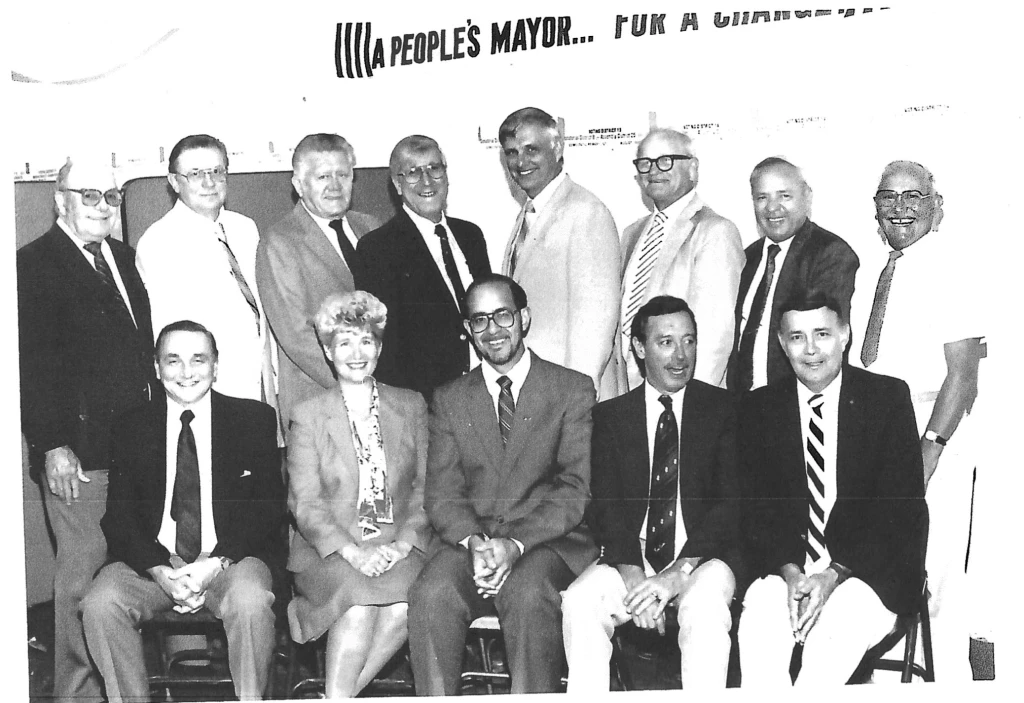
By now the campaign had added a tag line to all of our ads – simply put it stated, “Be part of the change”. Sensing a growing wave of support and trying to build on our string of endorsements, good publicity, and positive editorial comment, we were openly inviting voters to be part of the change, the effort to unseat Billy Mac. The subliminal message was your vote counts, and this is the opportunity you’ve been waiting for. It is time for the change. We had decided from an early point, that a big turnout of voters would be to our advantage.
Lawn signs, a standard part of New Britain politics, helped improve name recognition and encourage voter turnout. Our signs went up early exactly for those reasons. A regular crew of four to six volunteers was charged with putting up new signs and replacing and repairing old signs. My brother Jim often came down from Coventry and would spend an entire day planting signs. His work was recognized for the durability of the signs. When he put up signs, they stayed up. Over the course of the campaign we went through approximately 1,000 signs, as many would be vandalized or damaged in bad weather. A thousand signs was a large number for a “political unknown”.
Prompted by a suggestion from Steve Wasik, one of our Coalition members and candidate for City Treasurer, we took another step and bought space on a number of billboards around town. Again, these went up to establish and reinforce name recognition. I remember the day those billboards went up. There is something reassuring about seeing your name in four-foot-high letters at busy intersections. It gave me a psychological boost.
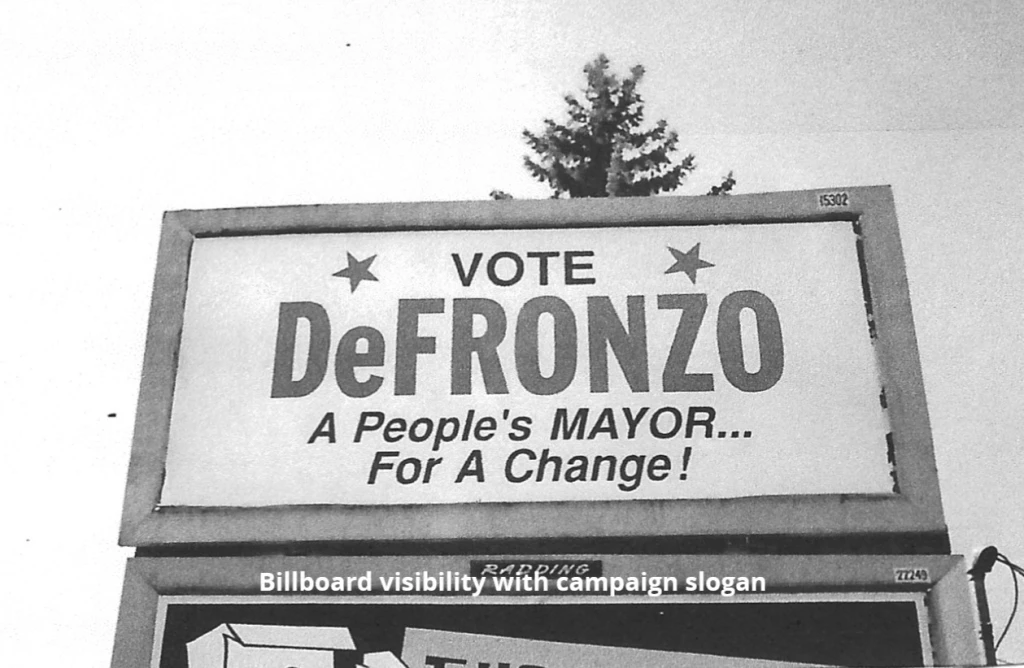
In the final days of the campaign McNamara and I sparred over funding for park improvements, the cost of proposed City Hall renovations and community development. Newspapers ran the obligatory last week candidate profiles and the campaign geared up for election day. Even at this late point we continued to speculate about a last-minute United Veterans action that might upend our momentum. Our last advertisement focused on taxes and “GOTV” – get out the vote. We also planned a large spaghetti dinner wrap up rally for Sunday, September 10, two days prior to the vote.
Surprisingly, on September 6th, the Hartford Courant acquired third quarter fund-raising numbers for both campaigns. Those reports showed that we had managed to keep pace with McNamara trailing him by a modest $6,100 overall and, importantly, the reports showed that in the third quarter we had outraised McNamara $17,742 to $12,512. The significance of that achievement did not go unnoticed by the press. Herald political reporter Bill Neagus reported that:
“It is significant because it is the first time since McNamara became mayor in 1977 that he has been behind in fund raising just before the primary.”
This provided one more shot of momentum building good news before voting began.
We now awaited the endorsements of the local newspapers, the New Britain Herald and the Hartford Courant. About a week earlier I had appeared before the editorial boards of both newspapers, separately, to defend my policy positions, political style, union relationships and CO status.
Both interviews went well, although I had no clear expectation of getting one, both or neither of the endorsements. McNamara was dean of Connecticut mayors, having served six terms in office, and, to many, had done a reasonably good job keeping New Britain afloat. Ideologically, I was a center left candidate and Mac was a center right candidate. How would all that, and our respective positions, play out in the endorsement process was an unknown. Diane was confident we would get both, I wasn’t so sure, but at this point I didn’t even know if it mattered much.
The first endorsement came from the Hartford Courant. On Wednesday morning, September 6, while I was still in bed, Jim Leavenworth called to congratulate me on receiving the endorsement. “Democrats Should Pick DeFronzo” read the editorial headline. It went on to read:
“Mr. DeFronzo, who is even tempered and thoughtful about issues, promises conciliation. He has won widespread organizational support in his first try for elective office. Mr. DeFronzo should represent his party…”
Editors said McNamara was:“… responsible for a siege mentality at City Hall and for creating a perception of inaccessibility. Despite achievements, McNamara’s tenure is marked by feuding with elements within his own party.”
Jim saw it as a solid endorsement that verified our claim of McNamara’s divisiveness and inaccessibility. More importantly, coming a week before the primary, the notoriety of the endorsement invigorated our campaign. Harper was happy, I felt good, and our momentum was running high.
Requests for rides to vote increased and positive feedback from our phone bank gave us more good news. Indications were that previously undecided voters were breaking our way.
On Sunday, September 10, our Get-Out-the-Vote Spaghetti Dinner Rally drew over 400 people. It was a great success, the largest turnout we had seen at any of our many campaign events. It was a great success with optimism running high.
The last pre-election analysis penned by Herald political reporter Bill Neagus anticipated a “too close to call” race. In the article Harper said, “It looks like a win…but I wouldn’t want to say by how much.” I was “cautiously optimistic”, while McNamara supporters predicted that, just as he had done in six previous primaries, Mac would prevail again. Democratic Registrar of Voters Ed Karwoski predicted a 52-54% voter turnout, a view supported by reports from the Town Clerk’s office that absentee ballot voting was running ahead of 1987 levels by 12%.
On Monday, September 11, one day before the vote, the Herald published an editorial which did not clearly endorse a candidate but encouraged voters to vote. Its editorial acknowledged Mac’s achievements but raised questions about his style. They characterized me as having a “laidback, analytical style…the complete opposite of the sometimes bombastic, always blunt McNamara”. I wasn’t thrilled with it, but on the other hand, the six -term incumbent did not get a stamp of approval from the city’s largest newspaper. I could not complain too much. In any event in 24 hours, we would know the outcome of this very long campaign.
Primary Day
Election day dawned with an unpleasant rumor that members of the United Veterans would be at the polls, dressed in military attire, encouraging voters to nix the CO candidate. That worried me, but as the early morning turned into late morning, no sign of veteran activity materialized.
In addition to our main headquarters at the Pulaski Club where rides were being coordinated and calls being made, we ran several satellite headquarters each with responsibility for voter turnout in two or three wards. My schedule had me visiting polling places around the city, greeting voters on the way in to vote. Voter turnout was indeed high – our more than 200 volunteers were doing their jobs. Voter response to the phone calls was positive and requests for rides were so heavy that we were forced to move several phone callers over to rides.
In those days absentee ballots received in City Hall prior to noon on Election Day were counted just after that. The remainder of the late arriving ballots would be counted after the polls closed. About 1:30 on Election Day I received a call from Democratic Registrar of Voters Ed Karwoski, telling me he wanted to share some confidential information with me. I had to pledge not to share the information with anyone, but it sounded important. Karwoski proceeded to give me the best of news of the day so far – we had taken a commanding lead in the early absentee balloting, 56% to 44%. It was only a small sample of voters, about 390, but it was a good indication of the vote to come. To be honest I did share that news with three people, Diane, Joe Harper and Walter Clebowicz. Who they told. I do not know. We all felt good about it.
I continued to greet voters until the polls closed at 8 P.M. I made a quick stop at home to pick up Diane, who had returned home to change after making phone calls all day. We quickly headed out to the Pulaski Club to get the results.
Campaign leaders suggested I remain in a downstairs office and preview results from the various polling locations before they were posted upstairs for the large crowd that had gathered there. Diane and I disagreed, and we decided to get the results with everyone else. With that we went upstairs and were greeted with cheers and the chant of “Don-ald, Don-ald.” They were ready to celebrate.
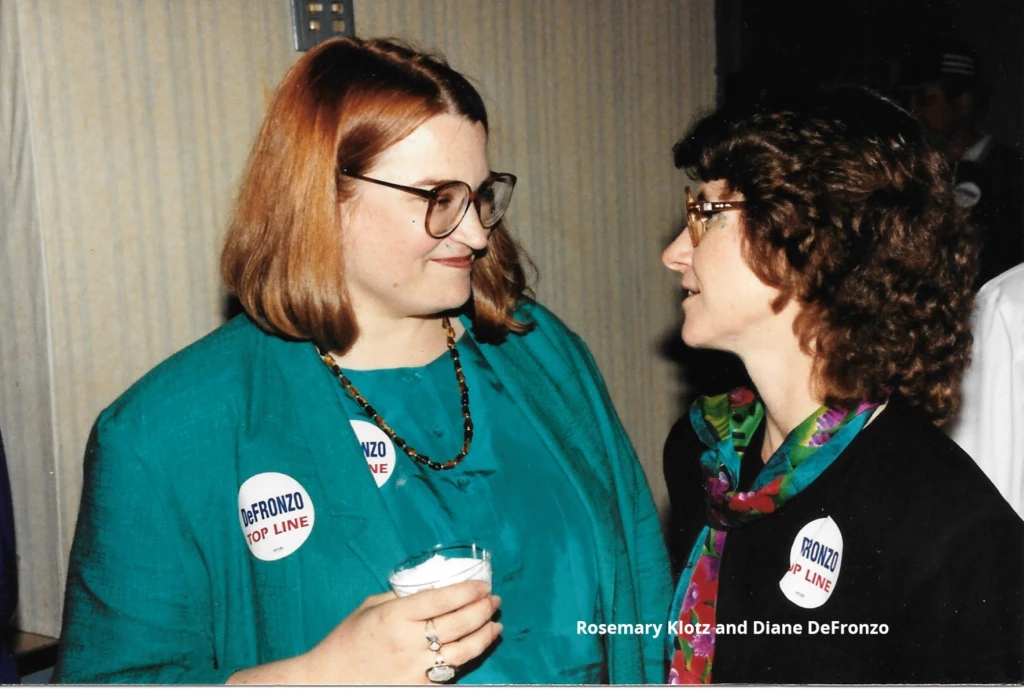
We took seats in the front row alongside my mother, brother, sister and two children. We were surrounded by old friends, relatives, and families from the Fagan Little League, where our son played, many of whom had volunteered in the campaign. Win or lose, we had made many new friends. My mother, Mary Pavano DeFronzo, at the very heart of this huge political event, was excited, proud and very nervous. There was a lot of pressure on everyone, but nobody could feel what a mother feels. As the results started to come in, just when the drama was greatest, mom started to cry and continued to cry until the last numbers were posted and victory was certain.
My mind faded back momentarily, to that day in early February when I announced my candidacy for mayor in this very same hall, under the watchful eyes of the portrait of Casimir Pulaski hanging on the front wall. We had come such a long way since then. I had worked hard, but I owed a lot to the leaders of the Coalition and especially to Joe Harper, Walter Clebowicz, Jim Leavenworth, my family, especially Diane and her dad, sister and our brother-in-law Paul Puzzo, who had worked hard on our fund raisers from day one. And, of course, I could never forget the hundreds of volunteers who made calls, stuffed envelopes, put up signs, tabulated canvassing results and did the thousand and one little things needed to run a successful campaign.
The first results had arrived, hand carried from the Graham Apartment Building, a self-contained senior housing complex in the center of the city with its own polling location, 61 votes for McNamara and 59 for DeFronzo. This was one of two voting districts in New Britain (the other is the School Apartments) that were considered McNamara strongholds because only he, as the incumbent mayor, had ready access to visit and campaign in these facilities. The close, two-vote margin, immediately suggested to me that we were going to be in good shape. Had we lost there by a wide margin, I would have been concerned.
Next in was Jefferson School, a voting district covering a small residential neighborhood in the northwest section of town. It was where my mom and dad had lived for nearly 40 years, and where I grew up – DeFronzo 184 – McNamara 136. Jefferson was followed by the Gaffney School voting district, a much larger, somewhat Italian ward on the westside of the city, DeFronzo 619 – McNamara 348. That was a particularly good sign. Next in was the School Apartments, and, as anticipated, Mac took it – McNamara 74 – DeFronzo 46.
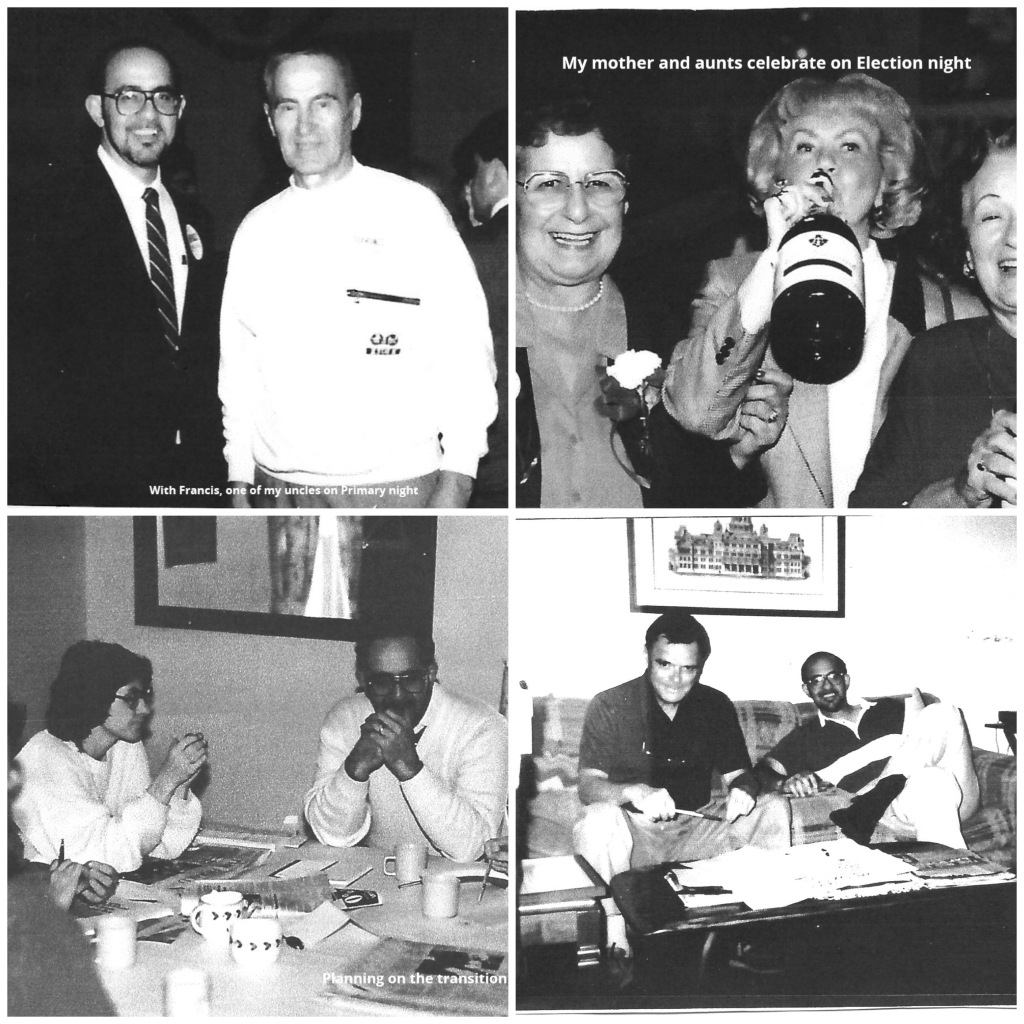
Results streamed in quickly.
The New Britain High School voting district, a large south end ward, reported next: DeFronzo 590 – McNamara 396. Now, with each result, the crowd cheered. Diane held my hand, and my mother was smiling. Knowing that we had done well with the absentees and had carried two westside districts and New Britain High School and our best districts on the east side were yet to come. I was beginning to feel good, although the Polish districts, often the difference makers, had not yet reported. I wanted to see one of those.
A string of east side districts reported:
Smith School – the lower east side – DeFronzo 478, McNamara 226. Then came Chamberlain School on the central east side and our home voting district: DeFronzo 306, McNamara 188. Welte Hall, another east end district, tallied DeFronzo 221, McNamara 179.
It was a clean sweep on the east side, as we had planned, and a healthy winning margin of close to 400 votes.
Mac’s home district, the DiLoreto School on the westside of the city, was next – DeFronzo 573, McNamara 482.
With that being announced, the crowd in the hall was turning euphoric. I turned to Diane and said, I think we got this. Harper, taking results at the front of the hall with Clebowicz, Klotz and several other Coalition leaders, couldn’t be contained – victory was on his face and with it, his stature in the party would be on the rise. Finally, news from two Polish Districts came in minutes apart:
Pulaski Middle School, an ethnically Polish upper westside district, totaled DeFronzo 377, McNamara 256. Similarly, Transfiguration Church, in the heart of Polish New Britain, voted DeFronzo 590, McNamara 404.
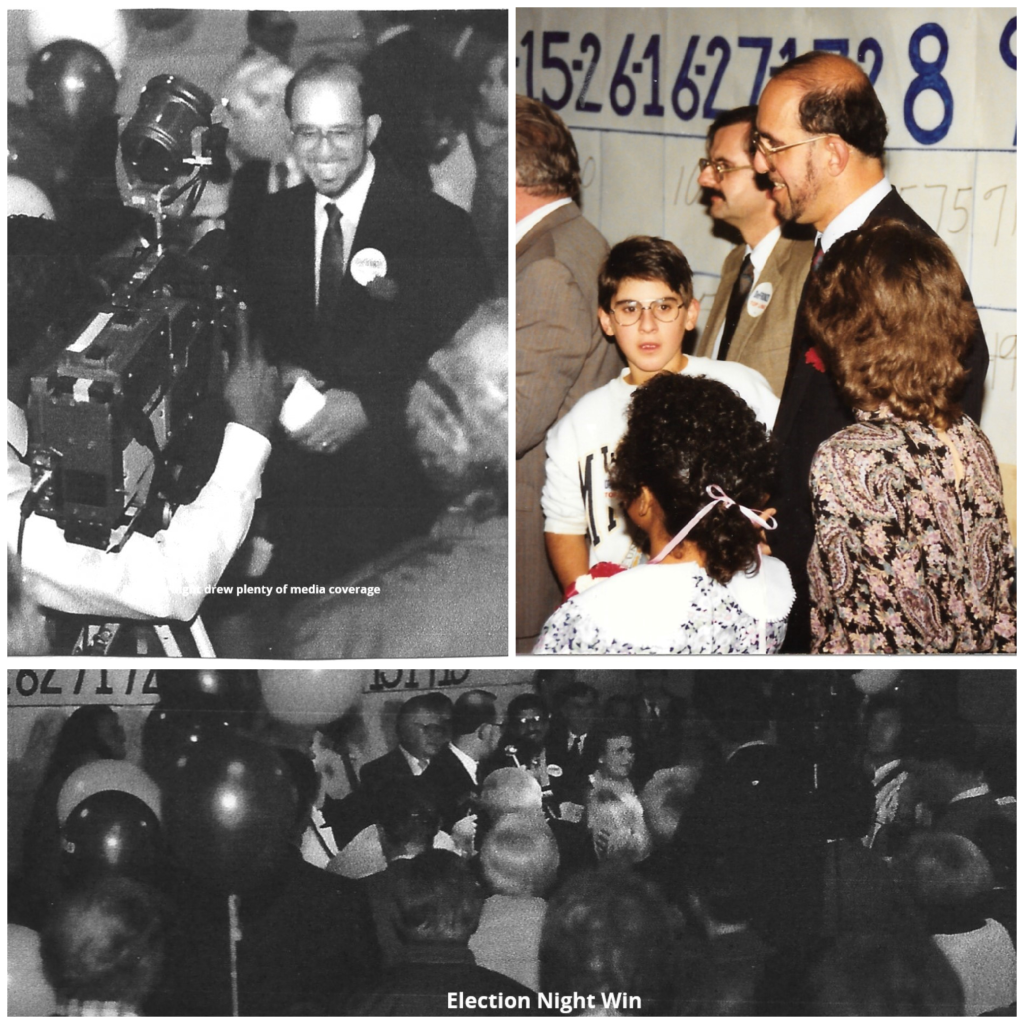
It was now all over but for the final totals and a lot of celebrating. We had won. Despite the overwhelming numbers, we didn’t want to claim victory until we heard from the McNamara camp, but the call came within an hour of polls closing. Mayor McNamara conceded at just about 8:45 P.M. A bit later he stopped into our headquarters to congratulate me in person, a gracious move from a guy not known for that type of response.
With Mac’s concession in hand, I addressed our supporters, now augmented beyond the capacity of the hall by Mac supporters, local businessmen and women, state party officials, city contractors and the statewide media. I claimed victory and made a speech thanking the voters of New Britain for their support, thanking the volunteers for their months of dedicated work and effort, and extended an invitation to Mac supporters to join our campaign.
.

The cheers of “Don-ald, Don-ald” resonated for minutes as I turned my attention to the press who were lined up for interviews. My victory was considered the major statewide upset of the primary season so, in addition, to the Herald and the Hartford Courant, TV and radio were there too. I spent a good hour with the press, not wanting to pass up one opportunity for additional coverage.
Although the results of the mayoral race were now settled, it was entirely unclear how well my slate had done. To get a better read on these results we later went to the Herald newsroom where the numbers were being tallied.
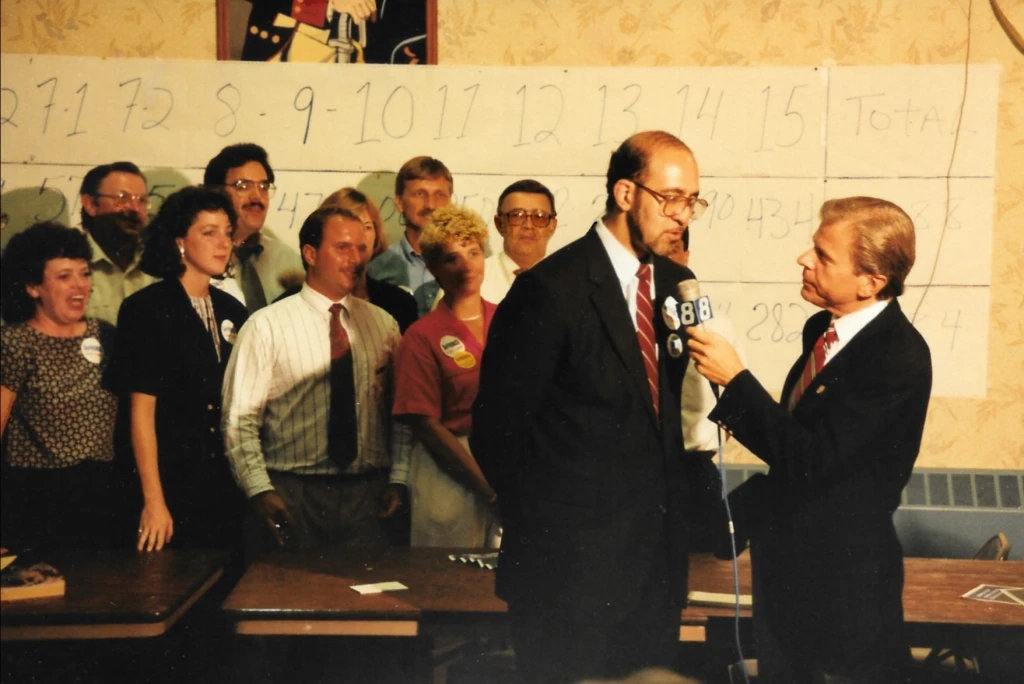
Soon we learned that Lucian Pawlak, our candidate for City Clerk, demolished the hapless incumbent Dick Murphy, who had, while waving his flag, reversed his retirement plans to save the city from the likes of Don DeFronzo. I must admit, that despite my hard-fought win over McNamara, nothing made me happier than to see that waste of taxpayer money, Dick Murphy, voted out of office. Steve Wasik was an easy winner for City Treasurer and Fred Menditto cruised to an easy win over his opponent for City Tax Collector. All three of our Board of Education candidates won easily and 13 out of our 15 candidates for City Council prevailed.
Council Majority Leader David Malinowski, his fate sealed by his early and ill-advised affiliation with Bill McNamara, was handily defeated by a crop of virtual political unknowns. Despite his last-minute efforts to salvage his progressive identity by challenging Moe Parparian, in the end, he got what he deserved. In addition to Malinowski, Connie Collins, the city’s only African American City Council member, and Henry Olszewski, a popular Polish American Alderman and unsuccessful candidate for mayor, also lost. Our victory was sweeping. Long-term City Council members, owing their offices to their ethnic heritage or affiliation with Billy Mac, were now being replaced by younger, less ethnic, more diverse and far more critical members. We took great pleasure in seeing, when all the votes were counted, that Moe Parparian, candidate for Board of Tax Review on the McNamara slate, and leader of McNamara’s assault on the CO issue, ended up being the lowest vote getter on the entire voting machine, a ringing endorsement for his slimy, incessant rampage against a legitimate candidate. Well done, Commander Parparian.
The voter turnout was 53%, above our 50% target number. We carried 15 out of 18 voting districts on the way to securing a 6,426 to 4,410, or 2,000 vote margin of victory, or in percentage terms, a 59.3% to 40.7% victory. By any measure, it was a crushing defeat for McNamara and his “band”. What had been projected to be a close race became a rout. McNamara himself called it a “drubbing.” The post- election analysis identified voter turnout, unusually high, as a key to our victory. I agree.
Two days after the primary a side bar story ran in the Hartford Courant summarizing a call between Marc Crowe, the New Britain political reporter, and me. Marc was doing a post primary interview trying to capture my emotional response to my crushing victory, wanting to know what I attributed the victory to. The conversation was overheard by his editor. Marc talked about contrasting styles between Bill McNamara and me, and now Marilyn Kraczkowsky and me. He asked, “Can a guy who is thoughtful and reserved and as you describe yourself, a plodder, beat fiery and flamboyant? Do you think people are ready for a change in style? I gave him my answer, but it didn’t seem to strike the chord he was looking for. He asked me how it felt to defeat McNamara so thoroughly, even beating him in his home district. Again, I gave him my analysis, but not an emotional response. Disappointed that he had failed to trigger an emotional response from me, the conversation ended with his editor overhearing Marc’s comment as he hung up the phone. Finding it amusing, he included it in his side bar -“This guy is boring to the core. There is something to it.” Diane loved that article, cut it out and framed it for me.
The primary campaign was now over and we had precious little time to reach out to Mac supporters, rebuild our finances, expand our coalition and begin preparing for the November election against Marliyn Kraczkowsky, the credible Republican nominee.
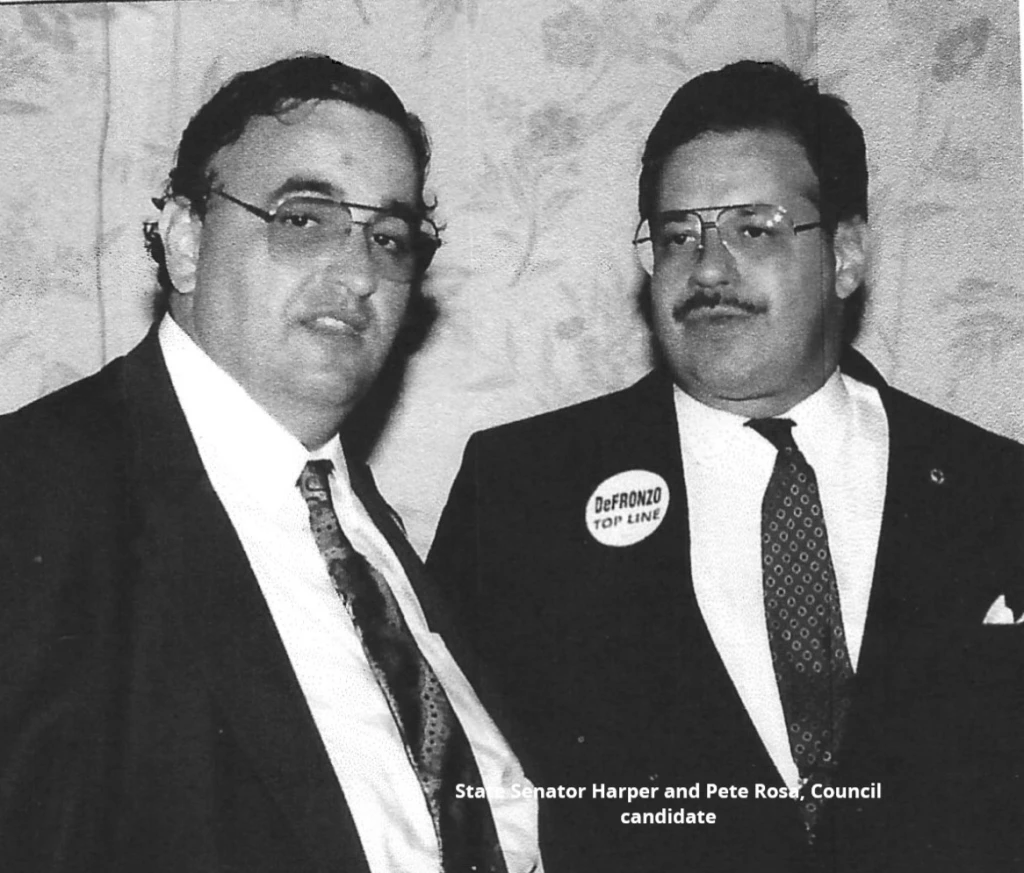
To be continued………

